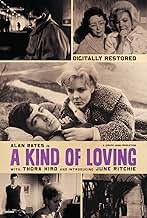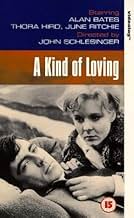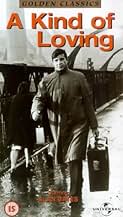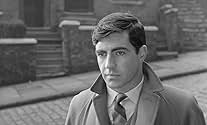IMDb रेटिंग
7.3/10
2.8 हज़ार
आपकी रेटिंग
अपनी भाषा में प्लॉट जोड़ेंAfter his girlfriend's pregnancy forces him to marry her, a young man must adjust to his new life and contend with his domineering mother-in-law.After his girlfriend's pregnancy forces him to marry her, a young man must adjust to his new life and contend with his domineering mother-in-law.After his girlfriend's pregnancy forces him to marry her, a young man must adjust to his new life and contend with his domineering mother-in-law.
- निर्देशक
- लेखक
- स्टार
- 4 BAFTA अवार्ड के लिए नामांकित
- 1 जीत और कुल 4 नामांकन
फ़ीचर्ड समीक्षाएं
10hague-1
I can watch this touching film over and over.
The black and white enhances the dramatic landscapes and atmosphere.
My favourite scene is the railway station where Vic hits rock bottom.
I also like the shelter scene as Vic pushes his luck and the picture pans back to the carved inscriptions.
It makes me wish I had been born in those times, with community spirit, dance halls and pubs with conversation for entertainment, football terraces and steam trains.
It is also interesting to spot so many young actors who found later fame such as "Nora Batty", James Bolam, Leonardo rossiter etc.
The black and white enhances the dramatic landscapes and atmosphere.
My favourite scene is the railway station where Vic hits rock bottom.
I also like the shelter scene as Vic pushes his luck and the picture pans back to the carved inscriptions.
It makes me wish I had been born in those times, with community spirit, dance halls and pubs with conversation for entertainment, football terraces and steam trains.
It is also interesting to spot so many young actors who found later fame such as "Nora Batty", James Bolam, Leonardo rossiter etc.
Excellent work from all concerned has gone to create what is probably, in spite of its generally melancholy atmosphere, the warmest of the realistic school of British movies from the early 1960s. Vic Brown is not as angry as Arthur Seaton in Saturday Night and Sunday Morning nor as alienated from his family as Billy Fisher in Billy Liar. And he is more likable than either Joe Lampton in Room at the Top or Frank Machin in This Sporting Life. Both Vic and Ingrid are sympathetic, recognisable people, who find themselves trapped in a situation with which their society's stern morality of self-control and self-denial, vividly expressed by Vic's sister towards the end of the film, has no sympathy at all. We finish with them trying to muddle through, and it is this compassionate but still unresolved finale that gives the film its hesitant title.
On the production side, the script, taken from Barstow's novel by those two stalwarts, Waterhouse and Hall, is bang on target; the photography, never less than excellent, is often breathtaking, as in the wonderful long shot of a romantic couple on Southport beach, gradually withdrawing into the confines of a hotel bedroom. But the usually reliable Ron Grainer doesn't quite seem to know where he's going with the music.
The performances are wonderful. The Brown family is lovingly portrayed with the lightest of touches, with particular praise earned by those two veterans, Gwen Nelson and Bert Palmer, as the parents. In the workplace, a fine group of actors, a number of whom were to become household names in the UK in later years, show their true mettle. And leading them all, that magnificent trio of Thora Hird, June Ritchie and Alan Bates.
Of Bates, a fine actor, who left a legacy of performances on film, there's no need to say much: he's perfect for the role, gets under its skin, reveals the longings, the confusions, the contradictions, the lovability, the vulnerability and the folly. No one could ask for more or better.
Thora Hird went on to enjoy a considerable Indian summer of success under the wing of the playwright Alan Bennett, but in spite of some remarkable work during those years, it's at least arguable that she never did anything on screen as intensely realised as Mrs Rothwell. Hird ensures that she is never a figure of fun or a caricature - indeed, she is often very touching in her protectiveness towards her daughter - but at the same time she gives the comic side of the character full value.
June Ritchie is absolutely wonderful as Ingrid. She may never have become the star that, say, Julie Christie (somewhat unwillingly) became, but she was and still is a remarkable actress, worthy of the greatest of respect for her achievement here. In a remarkable way, she fulfils all that was required of a Hitchcock blond: cool on the outside, with fire inside. In fact there's a moment early in the film where she is photographed from Vic's point of view, from behind and slightly above, with a hairdo reminiscent of Kim Novak's in Vertigo. One wonders whether the movie-going that was so evidently part of life in the town spills over into Vic's imagination at this point.
This is the work of a director who seems to have fallen out of favour in recent years, and there is a case to be made that he somehow lost his way. But A Kind of Loving is one of a trio of films, along with Billy Liar and Sunday Bloody Sunday, of which any director could be proud. Of the rest of his output, perhaps only his final collaboration with Alan Bates, An Englishman Abroad, has the same balance of clear observation and compassion.
On the production side, the script, taken from Barstow's novel by those two stalwarts, Waterhouse and Hall, is bang on target; the photography, never less than excellent, is often breathtaking, as in the wonderful long shot of a romantic couple on Southport beach, gradually withdrawing into the confines of a hotel bedroom. But the usually reliable Ron Grainer doesn't quite seem to know where he's going with the music.
The performances are wonderful. The Brown family is lovingly portrayed with the lightest of touches, with particular praise earned by those two veterans, Gwen Nelson and Bert Palmer, as the parents. In the workplace, a fine group of actors, a number of whom were to become household names in the UK in later years, show their true mettle. And leading them all, that magnificent trio of Thora Hird, June Ritchie and Alan Bates.
Of Bates, a fine actor, who left a legacy of performances on film, there's no need to say much: he's perfect for the role, gets under its skin, reveals the longings, the confusions, the contradictions, the lovability, the vulnerability and the folly. No one could ask for more or better.
Thora Hird went on to enjoy a considerable Indian summer of success under the wing of the playwright Alan Bennett, but in spite of some remarkable work during those years, it's at least arguable that she never did anything on screen as intensely realised as Mrs Rothwell. Hird ensures that she is never a figure of fun or a caricature - indeed, she is often very touching in her protectiveness towards her daughter - but at the same time she gives the comic side of the character full value.
June Ritchie is absolutely wonderful as Ingrid. She may never have become the star that, say, Julie Christie (somewhat unwillingly) became, but she was and still is a remarkable actress, worthy of the greatest of respect for her achievement here. In a remarkable way, she fulfils all that was required of a Hitchcock blond: cool on the outside, with fire inside. In fact there's a moment early in the film where she is photographed from Vic's point of view, from behind and slightly above, with a hairdo reminiscent of Kim Novak's in Vertigo. One wonders whether the movie-going that was so evidently part of life in the town spills over into Vic's imagination at this point.
This is the work of a director who seems to have fallen out of favour in recent years, and there is a case to be made that he somehow lost his way. But A Kind of Loving is one of a trio of films, along with Billy Liar and Sunday Bloody Sunday, of which any director could be proud. Of the rest of his output, perhaps only his final collaboration with Alan Bates, An Englishman Abroad, has the same balance of clear observation and compassion.
There's a frustrated young man, name of Vic, from a pool of young ladies he's picked, Ingrid Rothwell's her name, with a blonde flowing mane, she's the lass with whom he wants to tick. Ingrid's just as fond of this lad, now he's making advances she's glad, but he runs hot and cold, wants to do more than hold, so she lets him explore and un-clads. No surprise as nature takes its course, with a marriage hastily brought forth, which Vic starts to abhor, lives with Mother-in-Law, and his compass no longer points north.
Great dialogue, great performances, in a perpetually told tale of the ages, where the outcomes invariably reflect the times when the drama takes place, and leave you grateful for the times you live in today - I think it's called progress.
Great dialogue, great performances, in a perpetually told tale of the ages, where the outcomes invariably reflect the times when the drama takes place, and leave you grateful for the times you live in today - I think it's called progress.
I own very few movies - this is one of them. I've seen it many times and am always moved.
It is of course part of the special "Angry Young Man" genre that includes Billy Liar, The Loneliness of the Long Distance Runner, The Entertainer, Darling, A Taste of Honey, This Sporting Life, Look Back in Anger, Room at the Top, Saturday Night and Sunday Morning - and in later years, In Celebration and The Homecoming.
Such novelists/playwrights as John Braine, Alan Sillitoe, David Storey, John Osborne, Arnold Wesker, John Wain, Shelagh Delaney, directors like Karel Reisz, John Schlesinger, Lindsay Anderson and Tony Richardson, and such screenwriters as Waterhouse and Hall (who wrote this as Billy Liar).
The movies are primarily about men trapped by place and morality -- and either lashing out/escaping or trying to accommodate themselves to their situation. Most are set in the north of England - all are about people from working class backgrounds.
Stars like Richard Harris, Julie Christie, Alan Bates, Ian Holm, Albert Finney, and Tom Courtenay broke in their film teeth with these movies - and others such as Richard Burton, Lawrence Olivier, Laurence Harvey and Dirk Bogarde revealed their expansive range.
The protagonists are often not likable - certainly the pitiful Archie Rice in The Entertainer, Burton's character in Look Back in Anger, Finney's in Saturday Night and Sunday Morning, Courtenay's character in "Long Distance Runner" or Richard Harris' character -- are all people you'd rather not accompany on a long train journey.
However, Vic Brown, the protagonist in this one - is largely sympathetic (and wonderfully written and portrayed). His plight is just so realistic - and the consequences so easy to believe.
There are many things that our lad gets wrong - unable to break things off with a woman, he simply ignores her (and speaks badly of her to others) - yet is helpless when she suggests they get together again. In part, this is because his lust masters him - and in part because he just can't bear to tell someone he no longer wants to see her.
As awful as most audiences will find Ingrid's mother (wonderfully played), one can also have sympathy for her - a widow overly protective of her only child, and the circumstances in which her child finds herself.
The modesty of the characters is wonderful yet not overly done - it is the characteristic that yields immense sympathy in the viewer - this is especially true of the Brown family - from "our Christine" and her gentle husband to Vic's wonderful father and brother to his forceful mother.
Most of the reviews speak of this very much as a look back in time - I think it's not so past.
The themes are universal and timeless: lust and its consequences, indecision about a romantic partner, the division between a young person's caution about taking the right steps in life and closeness to family vs. inchoate yearnings to do great things far away - these are the stuff of such plays as The Fantasticks and such movies as It's a Wonderful Life. (Donna Reed's character wanted Jimmy Stewart's no less than Ingrid wanted Vic - and both men had dreamt to be far away doing great things).
This is wonderful - it will strike anyone as sharply observed, wonderfully written - and very moving.
It is of course part of the special "Angry Young Man" genre that includes Billy Liar, The Loneliness of the Long Distance Runner, The Entertainer, Darling, A Taste of Honey, This Sporting Life, Look Back in Anger, Room at the Top, Saturday Night and Sunday Morning - and in later years, In Celebration and The Homecoming.
Such novelists/playwrights as John Braine, Alan Sillitoe, David Storey, John Osborne, Arnold Wesker, John Wain, Shelagh Delaney, directors like Karel Reisz, John Schlesinger, Lindsay Anderson and Tony Richardson, and such screenwriters as Waterhouse and Hall (who wrote this as Billy Liar).
The movies are primarily about men trapped by place and morality -- and either lashing out/escaping or trying to accommodate themselves to their situation. Most are set in the north of England - all are about people from working class backgrounds.
Stars like Richard Harris, Julie Christie, Alan Bates, Ian Holm, Albert Finney, and Tom Courtenay broke in their film teeth with these movies - and others such as Richard Burton, Lawrence Olivier, Laurence Harvey and Dirk Bogarde revealed their expansive range.
The protagonists are often not likable - certainly the pitiful Archie Rice in The Entertainer, Burton's character in Look Back in Anger, Finney's in Saturday Night and Sunday Morning, Courtenay's character in "Long Distance Runner" or Richard Harris' character -- are all people you'd rather not accompany on a long train journey.
However, Vic Brown, the protagonist in this one - is largely sympathetic (and wonderfully written and portrayed). His plight is just so realistic - and the consequences so easy to believe.
There are many things that our lad gets wrong - unable to break things off with a woman, he simply ignores her (and speaks badly of her to others) - yet is helpless when she suggests they get together again. In part, this is because his lust masters him - and in part because he just can't bear to tell someone he no longer wants to see her.
As awful as most audiences will find Ingrid's mother (wonderfully played), one can also have sympathy for her - a widow overly protective of her only child, and the circumstances in which her child finds herself.
The modesty of the characters is wonderful yet not overly done - it is the characteristic that yields immense sympathy in the viewer - this is especially true of the Brown family - from "our Christine" and her gentle husband to Vic's wonderful father and brother to his forceful mother.
Most of the reviews speak of this very much as a look back in time - I think it's not so past.
The themes are universal and timeless: lust and its consequences, indecision about a romantic partner, the division between a young person's caution about taking the right steps in life and closeness to family vs. inchoate yearnings to do great things far away - these are the stuff of such plays as The Fantasticks and such movies as It's a Wonderful Life. (Donna Reed's character wanted Jimmy Stewart's no less than Ingrid wanted Vic - and both men had dreamt to be far away doing great things).
This is wonderful - it will strike anyone as sharply observed, wonderfully written - and very moving.
alongside Saturday Night & Sunday Morning and a Taste of Honey this is a great companion piece. Alan Bates is superb as a draughtsman in a busy factory and June Ritchie brings a tender portrayal as the object of Vics(Bates) desire. Thora Hird as the mother in law from hell is quite frightening and her scene with Vic Brown being sick behind her sofa is a classic. you filthy pig you filthy disgusting pig
You can feel her loathing. Some great support from Jack Smethhurst and the always excellent James Bolam. The scene that I favour is where Vic is getting bored with his situation and tries to get sympathy from his sister, his sister suddenly turns on him and tells him to get his life sorted, made bed lie on it etc. An absolutely fantastic slice of early 1960,s life.
You can feel her loathing. Some great support from Jack Smethhurst and the always excellent James Bolam. The scene that I favour is where Vic is getting bored with his situation and tries to get sympathy from his sister, his sister suddenly turns on him and tells him to get his life sorted, made bed lie on it etc. An absolutely fantastic slice of early 1960,s life.
क्या आपको पता है
- ट्रिवियाAt the start of this movie, Victor Arthur 'Vic' Brown (Sir Alan Bates) and some of his friends are seen perusing a magazine filled with shots of topless models. This is one of the first instances in British cinema showing bared breasts.
- गूफ़In the opening wedding scene, an elderly relative is prevented from taking photographs when the wedding car pulls up in front of her. She is, however, then seen taking pictures on the other side of the car as the bride and groom get in. Then as the car pulls away, she is back in her original position on the 'wrong' side of the car, still unable to take photos.
- भाव
Mrs. Rothwell: How dare you! How dare you say such filthy, disgusting things! You come into this house drunk, filthy drunk! You're filthy! You talk filth, you ARE filth! You're filth! You filthy pig! You filthy, disgusting pig! Filth, FILTH!
- कनेक्शनFeatured in Eurythmics & Aretha Franklin: Sisters Are Doin' It for Themselves (1985)
- साउंडट्रैकDown by the Riverside
(uncredited)
Written by Billy Sherrill and Charlie Rich
Sung at a bar on the pub crawl.
टॉप पसंद
रेटिंग देने के लिए साइन-इन करें और वैयक्तिकृत सुझावों के लिए वॉचलिस्ट करें
- How long is A Kind of Loving?Alexa द्वारा संचालित
विवरण
- रिलीज़ की तारीख़
- कंट्री ऑफ़ ओरिजिन
- भाषाएं
- इस रूप में भी जाना जाता है
- Nur ein Hauch Glückseligkeit
- फ़िल्माने की जगहें
- The Promenade, St Anne's on Sea, Fylde, लंकाशायर, इंग्लैंड, यूनाइटेड किंगडम(honeymoon of Vic and Ingrid)
- उत्पादन कंपनियां
- IMDbPro पर और कंपनी क्रेडिट देखें
बॉक्स ऑफ़िस
- बजट
- £1,65,000(अनुमानित)
- US और कनाडा में सकल
- $6,912
- US और कनाडा में पहले सप्ताह में कुल कमाई
- $3,278
- 9 अप्रैल 2017
- दुनिया भर में सकल
- $6,912
- चलने की अवधि1 घंटा 53 मिनट
- रंग
- पक्ष अनुपात
- 1.66 : 1
इस पेज में योगदान दें
किसी बदलाव का सुझाव दें या अनुपलब्ध कॉन्टेंट जोड़ें

































